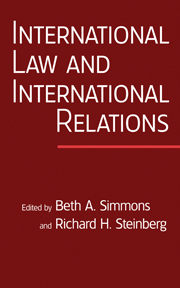Book contents
- Frontmatter
- Contents
- Contributors
- Abstracts
- Preface
- Editors' Note
- PART I INTERNATIONAL REGIMES THEORY: DOES LAW MATTER?
- PART II COMMITMENT AND COMPLIANCE
- 3 Democratic States and Commitment in International Relations (1996)
- 4 On Compliance (1993)
- 5 Is the Good News About Compliance Good News About Cooperation? (1996)
- PART III LEGALIZATION AND ITS LIMITS
- PART IV INTERNATIONAL LAW AND INTERNATIONAL NORMS
- PART V TREATY DESIGN AND DYNAMICS
- PART VI LAW AND LEGAL INSTITUTIONS
- PART VII OTHER SUBSTANTIVE AREAS OF INTERNATIONAL LAW
- References
- Index
5 - Is the Good News About Compliance Good News About Cooperation? (1996)
Published online by Cambridge University Press: 05 June 2012
- Frontmatter
- Contents
- Contributors
- Abstracts
- Preface
- Editors' Note
- PART I INTERNATIONAL REGIMES THEORY: DOES LAW MATTER?
- PART II COMMITMENT AND COMPLIANCE
- 3 Democratic States and Commitment in International Relations (1996)
- 4 On Compliance (1993)
- 5 Is the Good News About Compliance Good News About Cooperation? (1996)
- PART III LEGALIZATION AND ITS LIMITS
- PART IV INTERNATIONAL LAW AND INTERNATIONAL NORMS
- PART V TREATY DESIGN AND DYNAMICS
- PART VI LAW AND LEGAL INSTITUTIONS
- PART VII OTHER SUBSTANTIVE AREAS OF INTERNATIONAL LAW
- References
- Index
Summary
In the past few years many social scientists interested in cooperation have turned their attention to the problem of compliance in international regulatory regimes. Much of the empirical research in this area has been conducted by a group composed mainly of qualitative political scientists and scholars interested in international law. Its message is that (1) compliance is generally quite good; (2) this high level of compliance has been achieved with little attention to enforcement; (3) those compliance problems that do exist are best addressed as management rather than enforcement problems; and (4) the management rather than the enforcement approach holds the key to the evolution of future regulatory cooperation in the international system. As Oran Young notes, “A new understanding of the bases of compliance – one that treats compliance as a management problem rather than an enforcement problem and that has profound practical as well as theoretical implications – is making itself felt among students of international relations.” In short, not only are the dreary expectations born of factors such as relative gains concerns, collective action problems, anarchy, and fears of self-interested exploitation incorrect but also the enforcement limitations that always have appeared to sharply bound the contributions of international law and many international institutions now appear to have been exaggerated.
- Type
- Chapter
- Information
- International Law and International RelationsAn International Organization Reader, pp. 92 - 112Publisher: Cambridge University PressPrint publication year: 2007
- 1
- Cited by



